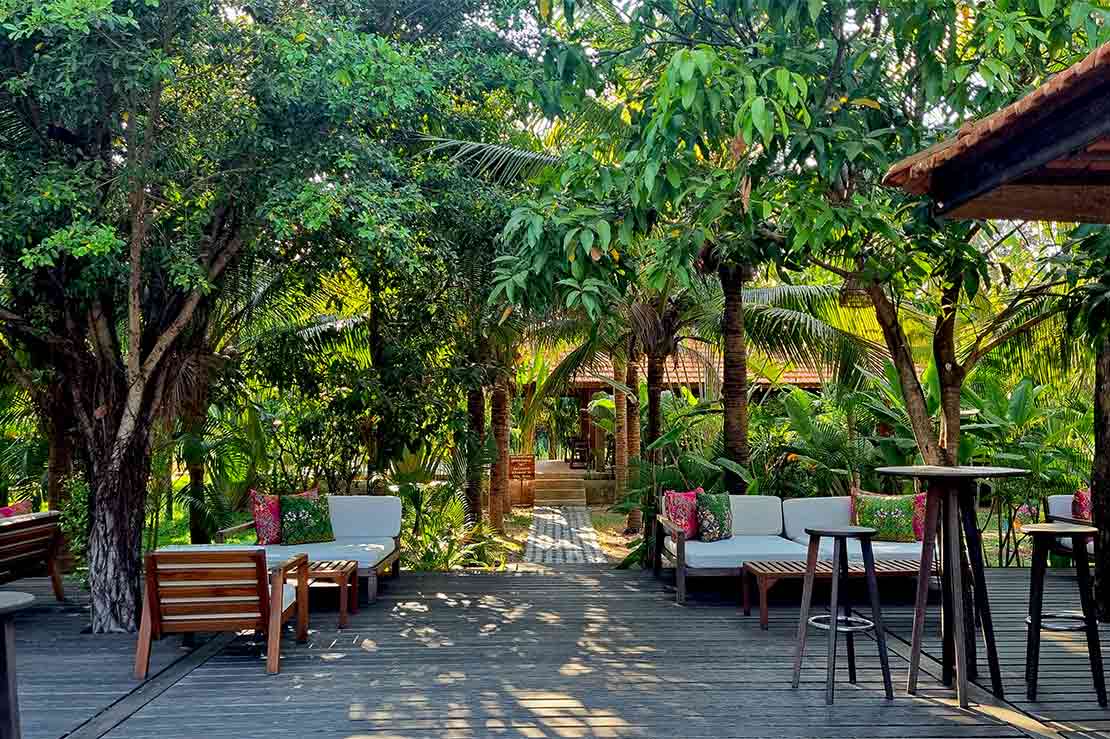The national flag ascended the pole gradually as the Cambodian national anthem resonated through the air. It's a daily ritual for the hundreds of young children hailing from various corners of Kampong Chhnang. The precursor to this spectacle was the motive behind my early rise at 6am – to observe the bustling activity outside Smiling Gecko Cambodia's (SGC) school gate. Here, parents travelled as far as 30 kilometres on motorbikes or bicycles to escort their children to school before returning home, a routine repeated daily for as long as the school operates.
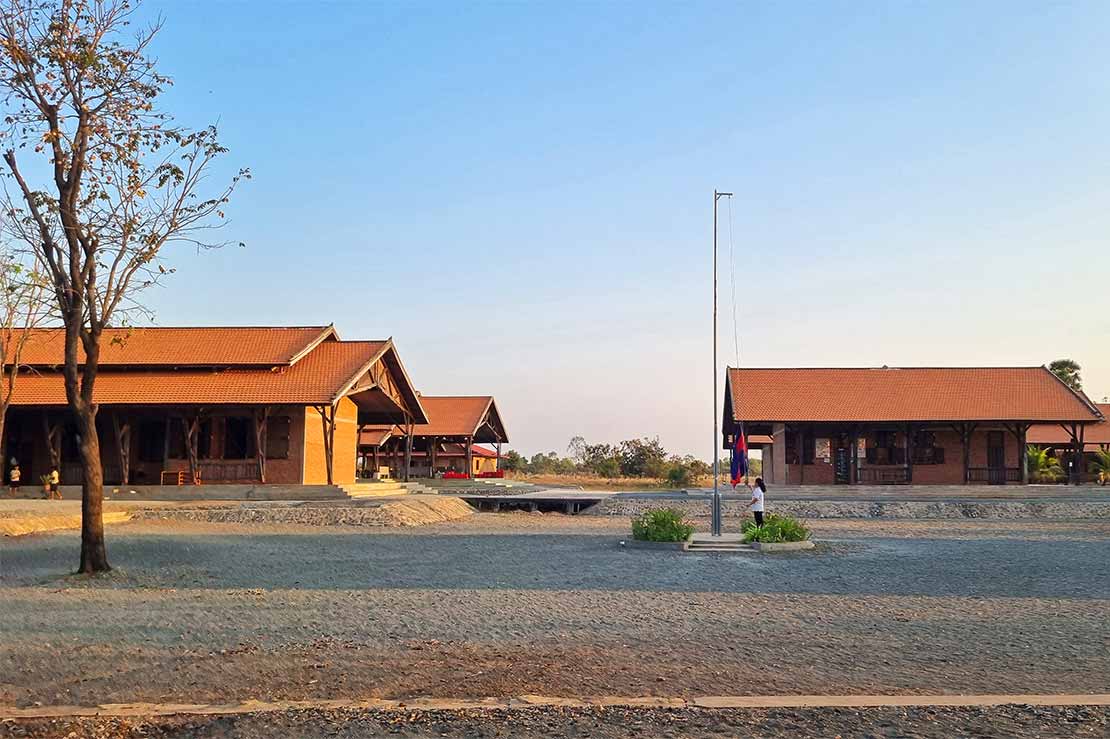
Before the assembly, a staff in Smiling Gecko School is preparing for the flag raising in a clean and neat school ground. [Photo: Kim Choong]
The campus tour by Farmhouse Resort & Spa is likely the most unique resort tour experience I've ever had and the most profound. Farmhouse is owned and run by SGC. I have wanted to witness this NGO-owned community from zero to a luxurious sustainable resort outside of Phnom Penh since I met with Chef Mariya Un Noun in a four-hands dinner in Singapore, and the SGC’s co-founder, Ngon Sokleap (Leap).
Origins of Smiling Gecko CambodiaCambodia is one of the poorest nations in Asia, with many children living in slums - areas resembling dump sites where families reside. Children are often seen scavenging through rubbish in search of food. Malnutrition is rampant, with little to no access to medical treatment, clean water, or education. Over a decade ago, renowned photographer Hannes Schmid witnessed these dire living conditions and felt compelled to take action.
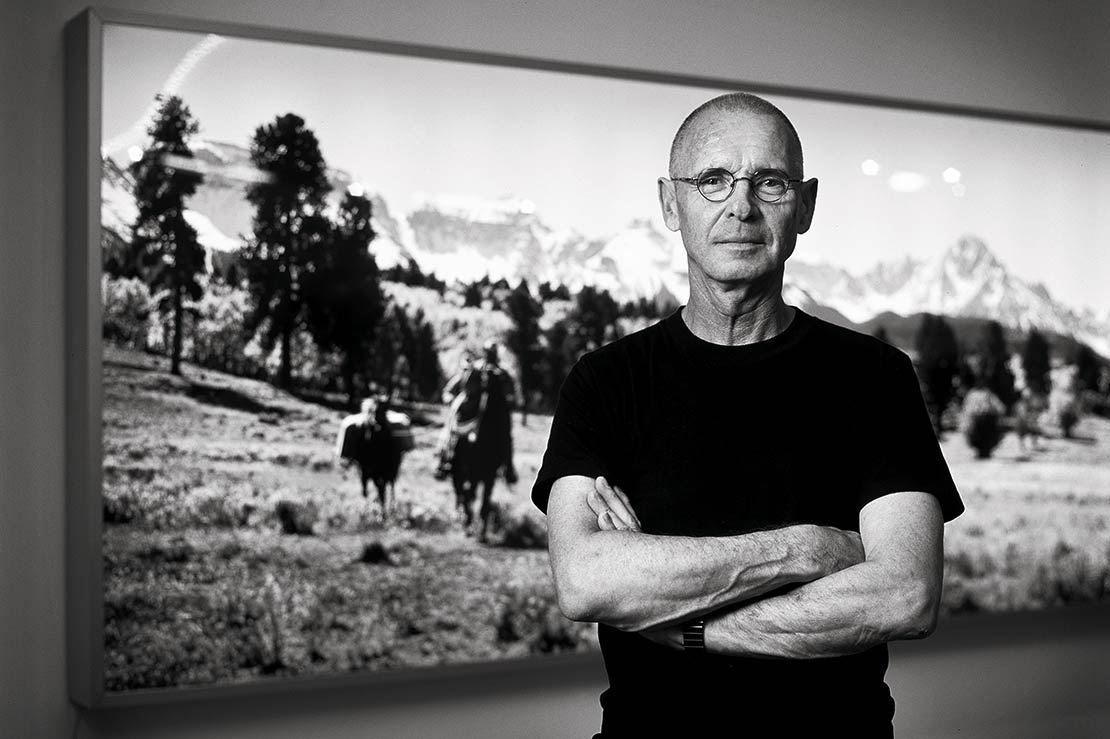
Hannes Schmid, renown Swiss photographer, co-founder of Smiling Gecko Cambodia. [Image source: Smiling Gecko]
Initially, Hannes captured images of the living conditions and rallied donations from friends and family to provide food and medical supplies to the communities in the slums. He also facilitated the children's enrolment in school and assisted families in finding housing and acquiring cattle to start sustainable livelihoods.
However, these efforts proved unsustainable. Schools lacked qualified teachers, leading to poor education outcomes. Families remained impoverished, resulting in hungry children unable to focus on learning. Hygiene was also a challenge due to inadequate clean water and facilities, leading to frequent illnesses. Additionally, families receiving farming aid struggled due to a lack of knowledge to growing crops on infertile soil.
In response to these challenges, SGC was established with the mission of empowering Cambodians to become self-sufficient. Having seen so many failed NGOs which could not sustain on donations, SGC was set to be a community that not only self-sustainable, it has to thrive economically and grow.
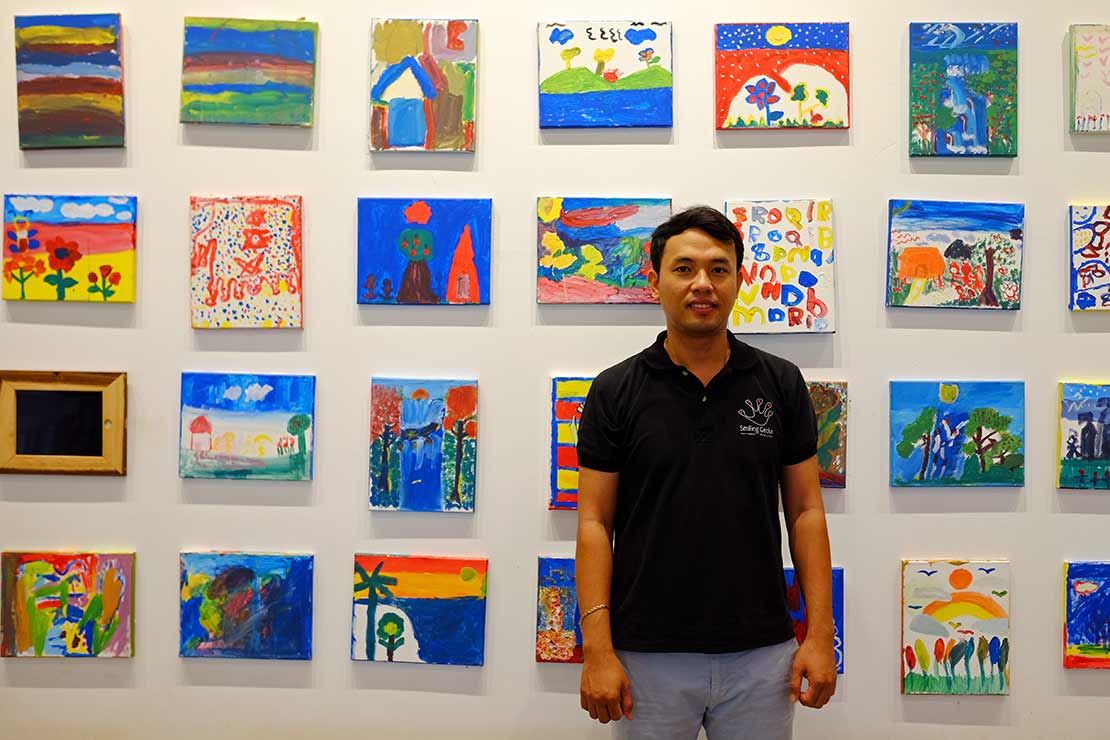
Ngon Sokleap (Leap), ex-lawyer and co-founder of Smiling Gecko Cambodia, an NGO with the mission to educate and train underpriviledged. Leap is standing in front of children's paintings exhibited in Farmhouse Restaurant. Anyone donating USD$500 and above can pick any of these paintings to take home. [Photo: Kim Choong]
To start, the project requires land and Hannes was advised to get a lawyer if he wished to proceed with his plan. He was introduced to Leap, a Cambodian lawyer who let go of his chance to further study in Australia to help with running SGC. When it began, SGC acquired a small plot of land in rural Kampong Chhnang in 2014 to provide a place to live and training in farming techniques for the families in the slums.
Leap is one in four siblings born out of a village known for their fish nets. In the 1990s, plastic took over the country and the fish net business was pushed to oblivion. Leap’s family moved to the city to find work and with little they could afford, they put Leap through school. Being the only child to receive education, Leap wants to give back and do whatever he can “as a Cambodian who helps Cambodians”. The ex-lawyer is determined that SGC will become a blueprint and replicable anywhere else around the world.
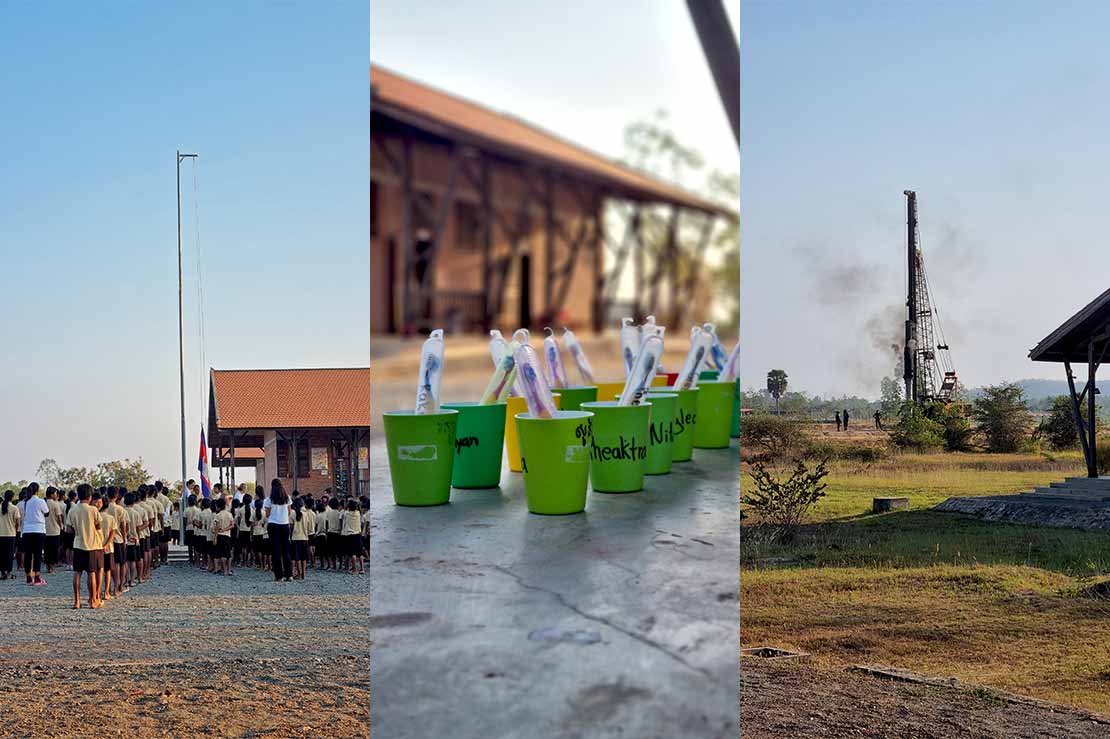
From left: Morning assembly; Toothbrush sets for every child for the morning routine; Developments are ongoing for the campus at Smiling Gecko, depending very much on available funding. [Photos: Kim Choong]
Note: Most of the slums in Cambodia are no longer accessible and closed off to any outsiders.
A decade on, SGC now manages a 150-hectare cluster project benefiting approximately 30,000 nearby residents. The campus includes agricultural facilities, a manufacturing complex, an award-winning resort & spa, and an innovative school serving around 500 children. A cultural centre is also in development, highlighting SGC's commitment to continued growth and impact.
Agricultural Endeavours
It took years of trial and error for SGC to grow to its current size. For the first three years, a few families from the slum started to lay the groundwork, their first challenge was making crops thrive in Kampong Chhnang's sandy and dry soil. They fertilised the soil, installed proper irrigation, and continually enriched it until it was fertile enough for crops.
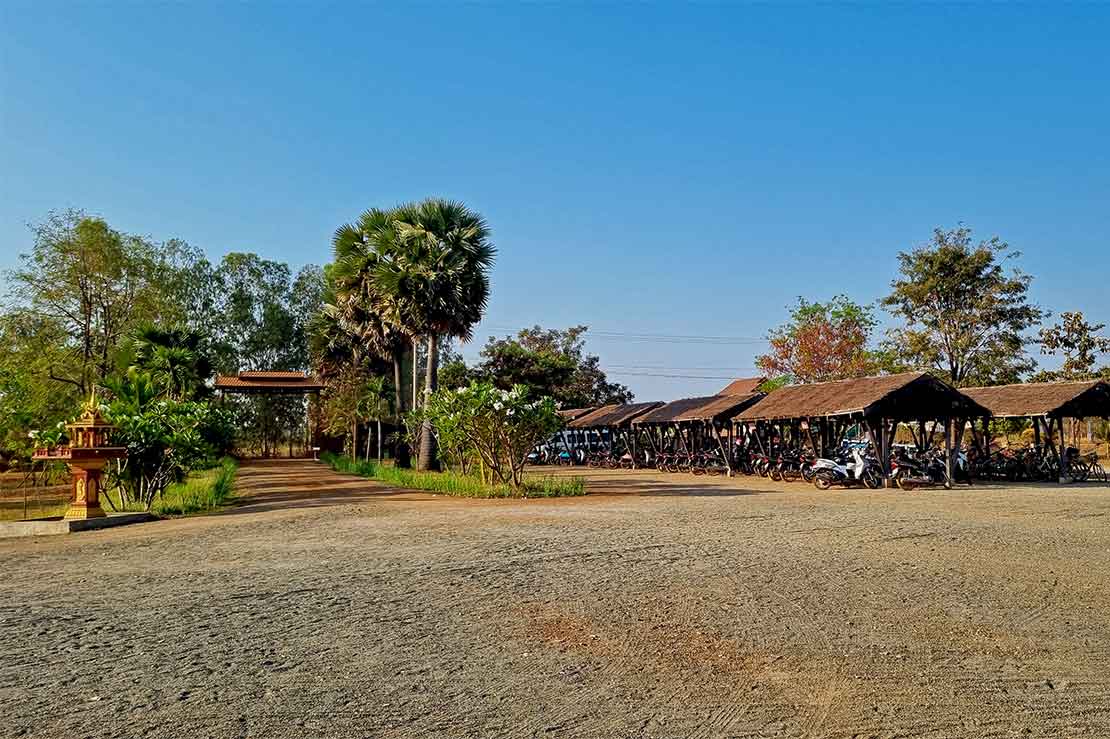
The front of the school, where parents drop-off and pick up the children. [Photo: Kim Choong]
The original patch where SGC began farming is now a garden to more than 30 varieties of herbs and flowers for the kitchen team. They now rotate crops and introduce new species, including the latest addition, Tahitian Vanilla. With the help of a hobby planter in Siem Reap, 500 80cm vanilla plants now occupy 3 greenhouses. It takes 2 and a half years for these plants to flower, expected to sell for 4 to 5 US Dollars per 5g pod. If it works out, the second most expensive spice in the world is going to be additional help to funding the SGC project.
In addition to vegetables, herbs, and spices, there are chicken and tilapia farms. Kampung chickens, known for their free-range lifestyle, provide protein-rich eggs. The living conditions for the chickens have been optimized to avoid genetic issues, fetching higher price in the market.
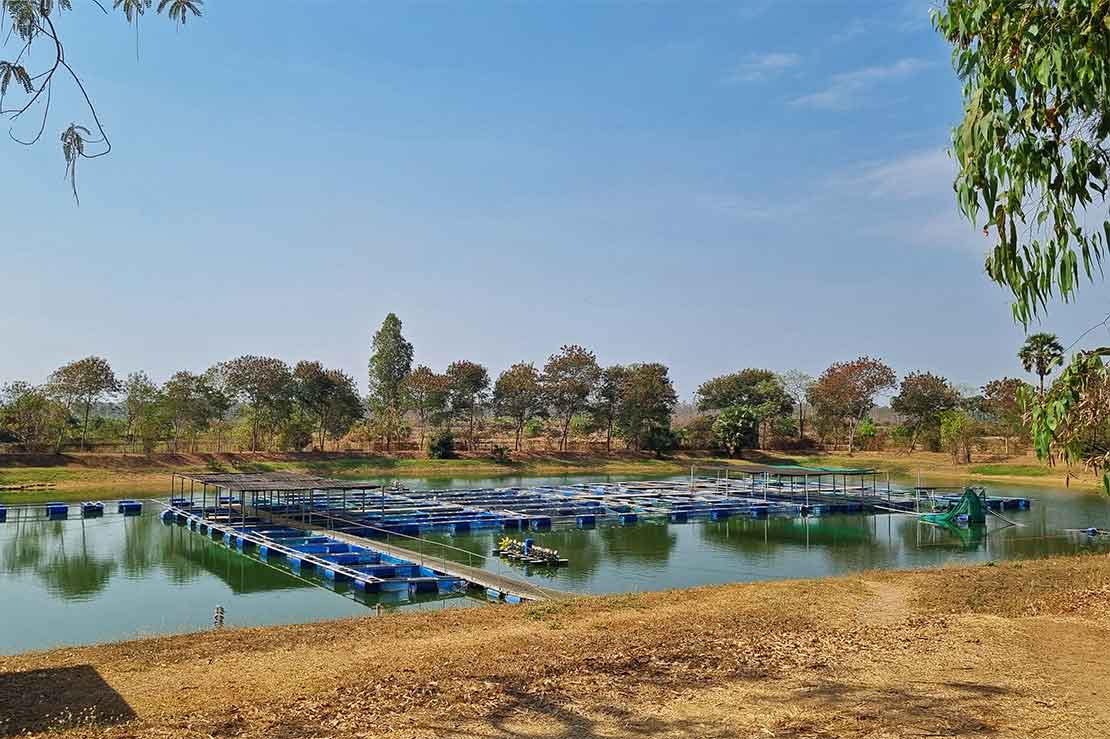
The farm also have a big facility for Tilapia (Nilofish) farming. The species is very productive and can be dominant in the water, which as a result, not allowed to breed in the Mekong River. Tilapia farming was chosen for the species’ resistance against high temperature, low oxygen requirement, and very fertile. One mother can lay as many as 5000 eggs a year. Also, the fish can live in a pond without needing water currant, that fits SGC’s inland feature. [Photo: Kim Choong]
There used to be pig farming but due to the African Swine Flu, all 300 pigs had to be slaughtered. “Until a vaccine is found, we won’t be investing in any pigs. The risk is just too high,” explained Leap as we move along the farm in a buggy.
Educational Initiatives
During our tour of the school led by Leap, we were accompanied by other visitors, including a family from Switzerland and a Swiss cyclist who had detoured from his bike trail from Singapore to Ho Chi Minh City, all there to support the cause. While awaiting the daily assembly in the school's centre field, most children were shy, some inquisitive ones approached and greeted us "Good Morning." Books were available for those interested in reading, and remarkably, there were no crying children – they all seemed at home and genuinely happy to be there.
Established in 2017 with 135 children, the school now supports 500 children aged 3 to 15, spanning pre-school, kindergarten, and grades 1 to 12, with the highest grade currently at 6. The aim is to enrol at least 50 more children each year until reaching a maximum of 1,000 students. “We take only one child per family, so that more families can benefit from the school education,” said our host. He further shared plans for expanding education beyond the 12th grade and their progressive setup for higher education.
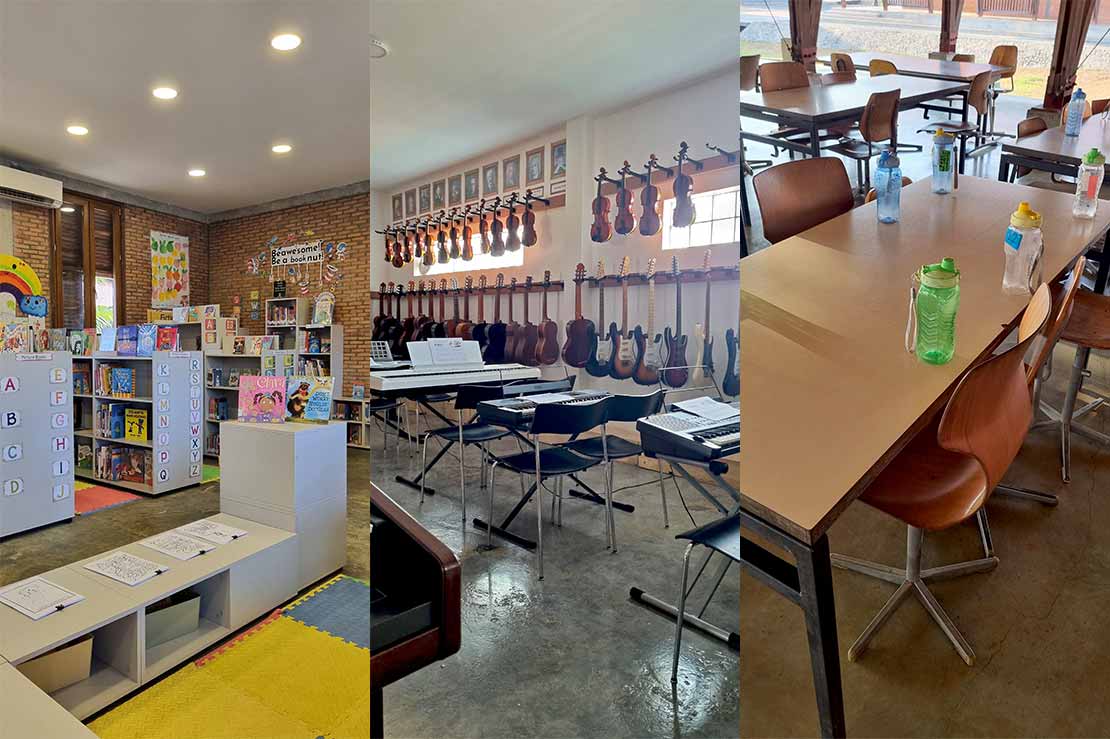
From left: Library, music room and children's water bottles on canteen table. [Photos: Kim Choong]
Discussions were already underway with universities and colleges for academic learning and vernacular skills, “Five years ago if you asked the children what their ambition was, it’s to be a factory worker, because their parents did that and that was the best option. Not anymore. Children tell you now they want to be a chef like Chef Mariya, be a doctor like the physician who treated them here, be a carpenter, engineer… and so many more.”
Located an hour and a half ride from Phnom Penh city centre, Kampong Chhnang faces challenges of limited access to clean water and electricity with many families living in indigence. Hygiene and nutrition are top priorities at the SGC school, with children’s first tasks were taking turns for showers, hair washing, and nail clipping, followed by breakfast before returning to the classrooms to learn. In Cambodia, children’s malnutrition usually starts with the mother due to poverty. Therefore the school provides breakfast and lunch planned with a balance diet in mind.
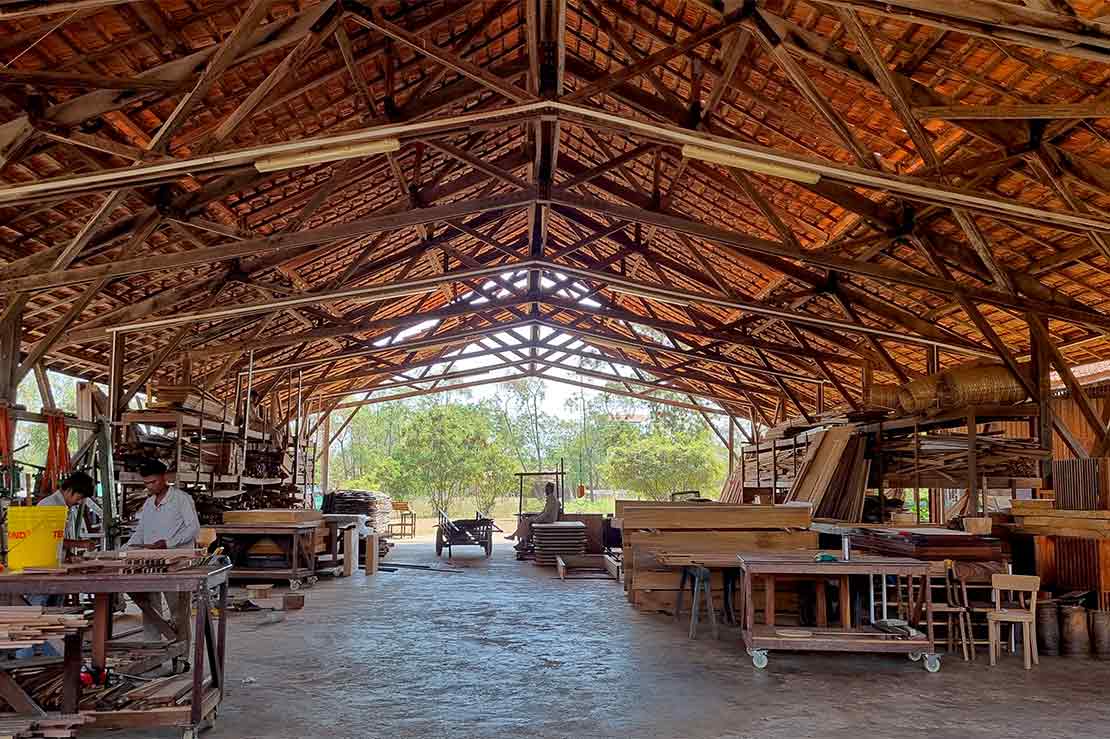
The carpentry that builds every wood work in Smiling Gecko. [Photo: Kim Choong]
The school's structures, built entirely by carpenters in SGC, feature wide hallways to shield classrooms from the elements. Materials like wood and red bricks withstand the seasons, while bamboo ceilings provide insulation. Facilities include a bilingual library, a clinic staffed by physicians for four weeks annually, serving both children and villagers in need of medical attention, and most impressively, a music room which was equipped with music instruments that can form multiple orchestras and their parts for repair.
World-Class Fine Dining Destination
One of the earliest beneficiaries of SGC’s efforts was Mariya un Noun, now the Head Chef at Farmhouse Resort & Spa.
Mariya had a difficult childhood, forced into servitude to support her family. She suffered abuse and fled, only to face repercussions upon her return. While being on the street, Mariya got pregnant and abandoned by the child's father, she found herself homeless until discovered by a tuk-tuk driver, a co-founder of the cause. Mariya was then was taken in and put to school to learn English, while her baby was put in childcare.
By chance, she took over the cook’s duty one night and presented a most skilfully prepared dinner for Hannes and his philanthropy friend from Switzerland. A second night of the same delicious meal arouse Hannes’ curiosity to find out what the cook did differently and to realise it’s not the usual cook at all.
The discovery of Mariya’s distinctive talent had presented her the opportunity to study culinary in Switzerland, thereafter opening up the opportunities to cook alongside world renown chefs like Andreas Caminada and Franck Giovanni. Story of Mariya is a testament to one’s perseverance, determination and ambition, to prevail with the right environment, support and opportunity.
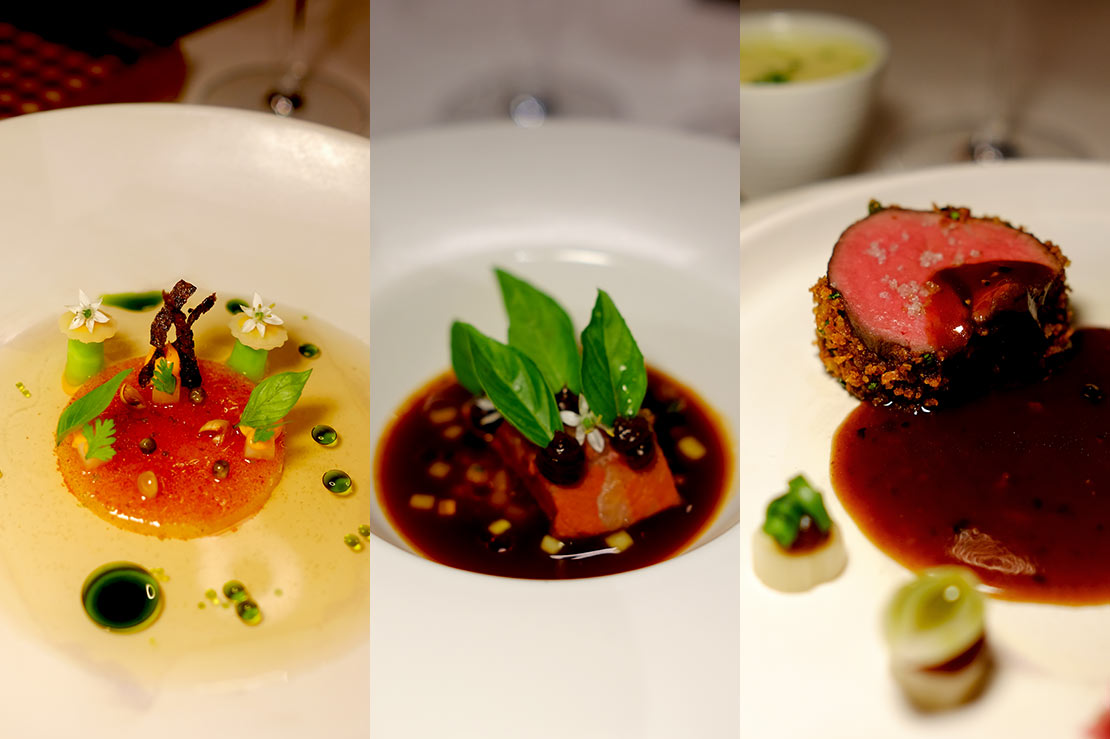
From left: Beef soup with small diced vegetables, pickle, mushroom, holy basil and garlic puree; Black Nilofish (Tilapia) fillet wit coconut sauce, Khmer Kroeung Bok and pumpkin puree; Beef fillet with kampot pepper sauce, pickled shallot and leek [Photos: Kim Choong]
Restaurant “UN” and the Chef’s Table at Farmhouse stand as premier culinary destinations in Phnom Penh, offering Khmer cuisine infused with French culinary flair, known as “Nouvelle Khmer cuisine.” A 5- or 7-course dinner menu is available on Thursdays to Saturdays, blending traditional recipes with Mariya’s refined techniques. The restaurant can seat 24 guests and features a wine cellar offering a range of old and new world wines to complement the dining experience. Farmhouse also hosts a chef program that allows European chefs to be stationed there for 6 to 8 weeks.
The Chef’s Table, an exclusive 8-seater dining option, offers guests a front-row seat to Mariya and her team’s culinary artistry. Hosted in the private bungalow of SGC’s founder, it begins with a sunset bubbly session on the deck.
Luxury and Eco-Friendly Retreat
I spent 3 days at the eco-resort in the classic Khmer style Luxury Suite Bungalows (97sqm), the biggest room among three types with the other two are Deluxe Khmer Bungalows and Premium Khmer Bungalows. Each room is adorned with Hannes’ photography of local scenery, complemented by energy-efficient bladeless inverter air conditioners.
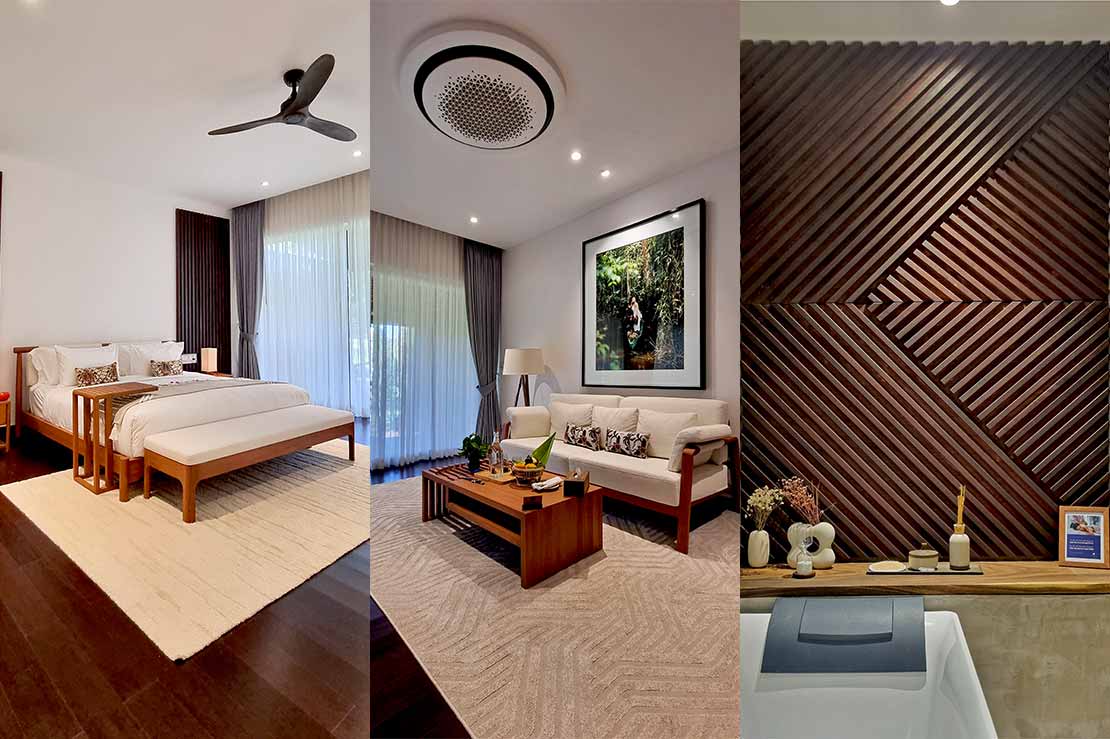
From left: Modern design room with King size bed; Refined furniture from the carpentry in the campus and Hanne's artwork on the wall; Relaxing colour tone and design for the bathroom. [Photos: Kim Choong]
The bungalows themselves are also crafted by the carpentry department, which now boasts a new metal section adjacent to it, thanks to a generous donation by a Swiss couple. They've relocated their entire production here and will assist in training the locals for 2 years before retiring.
The resort features two saltwater pools: one for all guests with an attached bar and another adult-only pool for a more private experience, both equally tranquil. A coconut tree-lined path leads to the Spa Sanctuary, also the home to many rare Cambodian plants. The impressive 8,000sqm spa sanctuary offers a serene retreat for yoga enthusiasts and nature lovers alike with their 8 treatment rooms, a pool with an attached Sanctuary Café, serving healthy food and drinks. Their comprehensive Khmer traditional treatments, administered by experienced therapists, provide the perfect space for revitalisation.
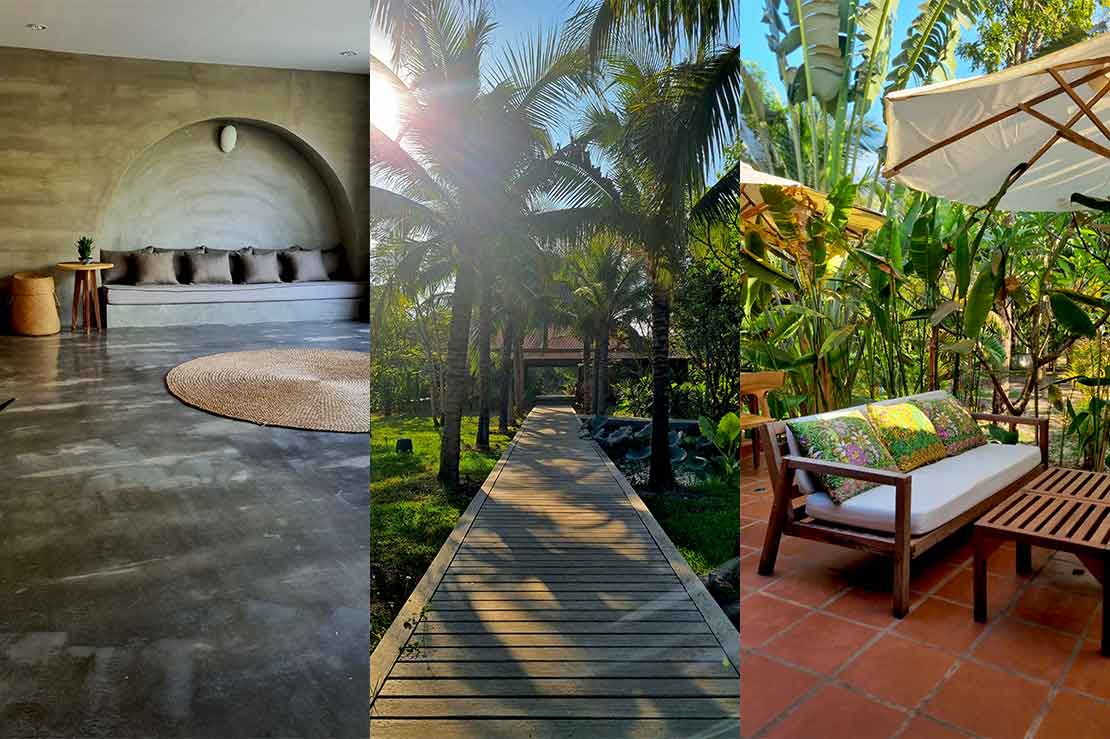
From left: Spacious spa room, one of the eight treatment rooms; Tree-line walkway to zen-ness; Outdoor seating at Farmhouse Restaurant. [Photos: Kim Choong]
State-of-the-Art Cultural Centre
The culmination of our tour was the Cultural Centre, the first in Cambodia, set to open by the end of June 2024. When asked why a cultural centre and not more bungalows for additional income, Leap paused, then answered with a grave expression, “We lost many intellectuals during Khmer Rouge: teachers, professors, and artists. It affects us through generations. Without a good education program, we’d be left behind. We quickly realised the importance of culture as well. This Culture Centre is built with several objectives in mind. First, we need to reclaim lost culture. Secondly, our children need a place to showcase their talents, and they are exceptional performers. Thirdly, it's a space to connect with both local and international artists.”
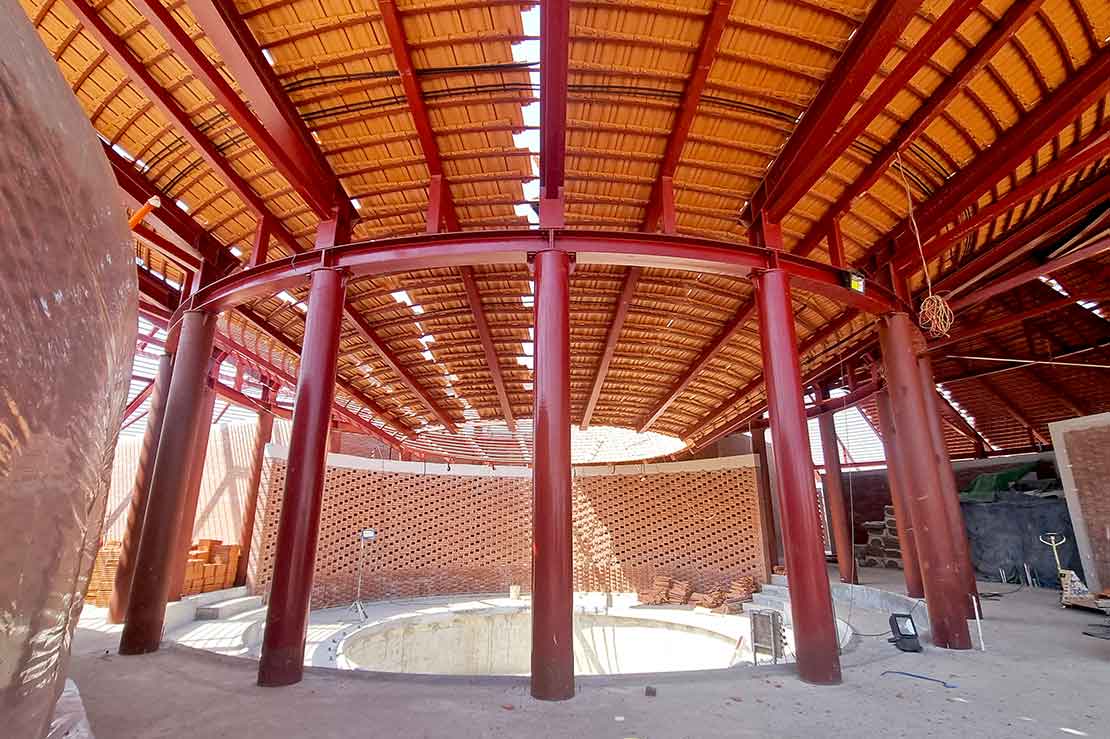
The cultural centre scheduled to complete in June 2024. [Photo: Kim Choong[
As I stood by the pit destined to transform into a water-collecting pond from the roof, it brought to mind the majestic Rain Vortex at Jewel Changi. The Hit & Miss brickwork, facilitating airflow and light, lends a harmonious aesthetic to the structure. Inside the auditorium, grand screens and multiple stages will set the scene for captivating performances and recordings.
Hope For The Future
I know it sounds like a lot to take in, and it is.
Reflecting on my encounter with Mariya, I recalled her warmth and youthful spirit. In the kitchen, she transformed into a different person – assertive, swift, and meticulous. She brings Cambodia to the world through food and Leap rebuilding the nation through hope. They are two in a million, but imagine a million of Mariya and Leap, what would the future of Cambodia be?
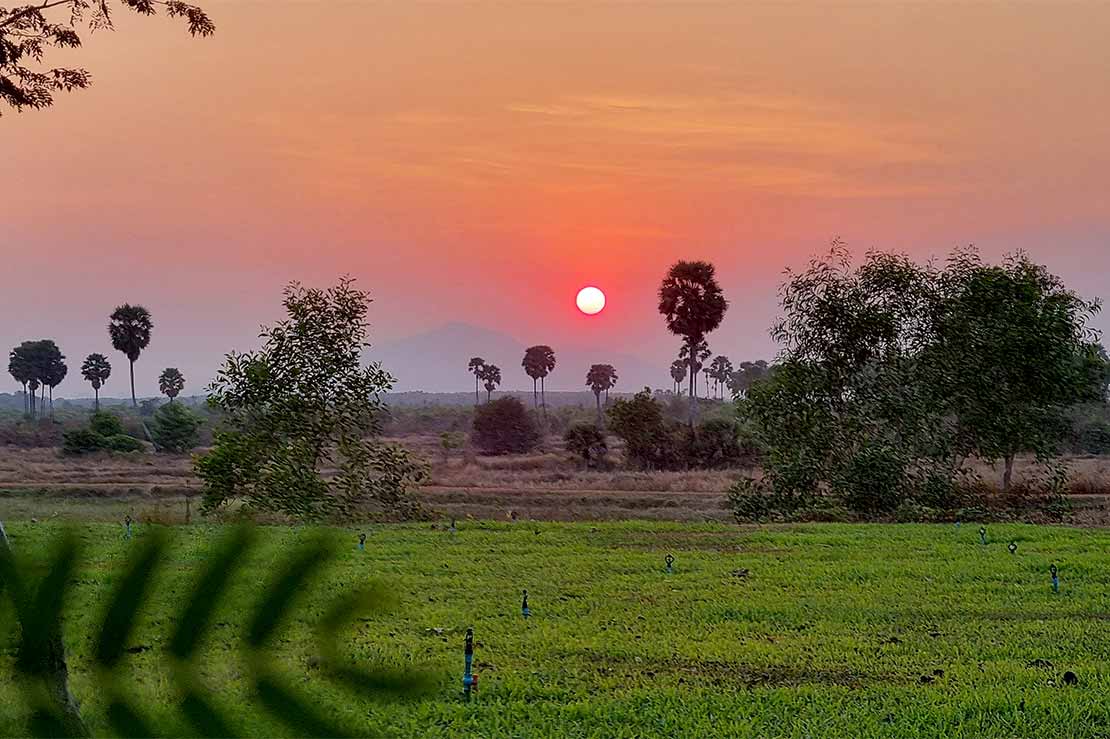
Enjoy the sunset view as the sky changes colour in a short gap in the evening over some bubbly, an exclusive feature for private dining guests that takes place in Hannes' bungalow on campus. [Photo: Kim Choong]
In the faces of Mariya, Leap, and the countless children whose lives have been transformed by SGC, I see hope for the future of Cambodia. Their resilience and determination inspire me, and I am confident that SGC’s successful model can be replicated worldwide.
Embark on a transformative journey at Farmhouse Resort & Spa and experience firsthand the impact of sustainable community development. I assure you, it will forever change your perspective on the world.
Smiling Gecko Cambodia and Farmhouse Resort & Spa are located at Sameakki Mean Chey District, Kampong Chhnang Province, Cambodia. For enquiries, call +855 11 67 95 95 or email info@farmhouse-smilinggecko.com
- T -
